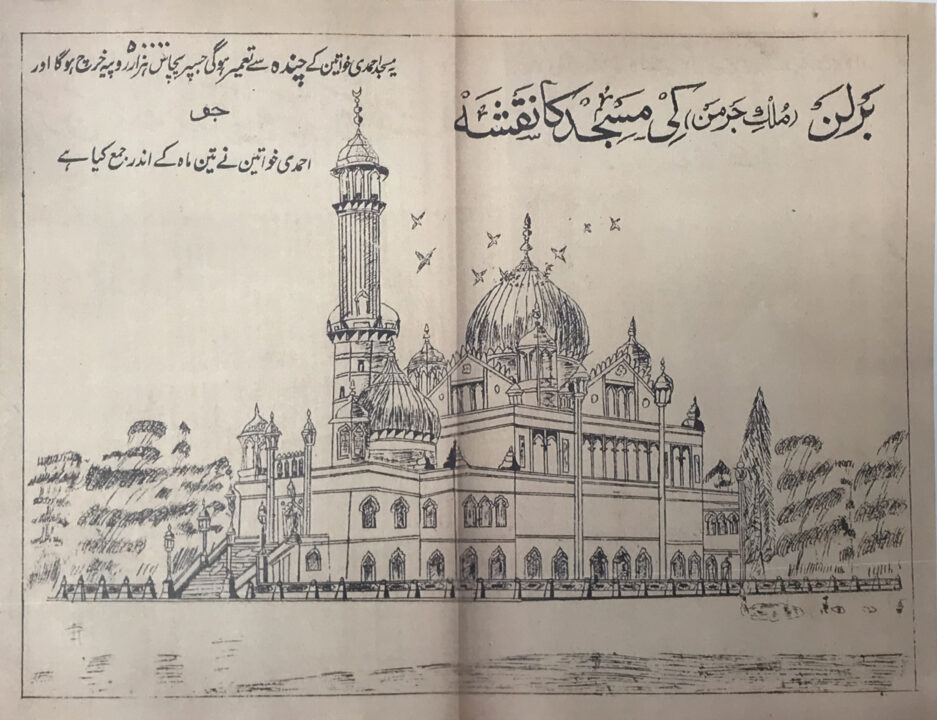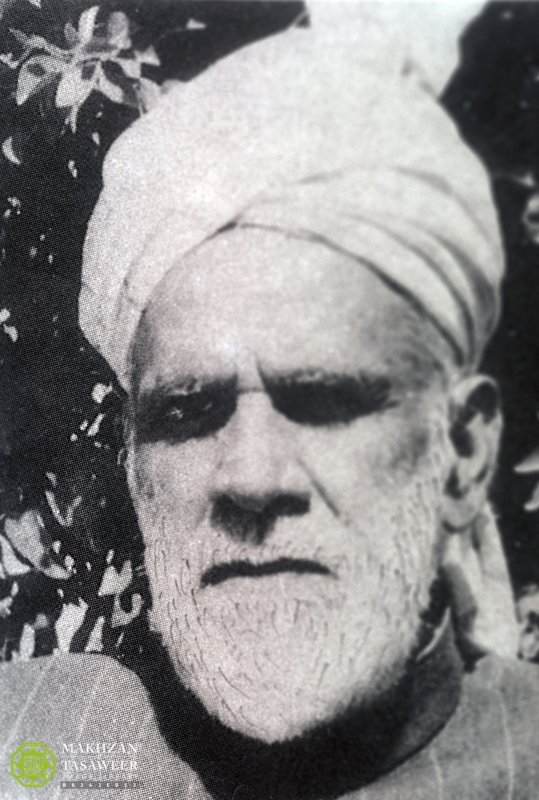Al Fazl, 25 & 28 March 1924
Hazrat Maulana Malik Ghulam Faridra MA (1897–1977)

By the sheer grace and mercy of Allah the Almighty, I, along with my wife and child, arrived safely in Berlin on the morning of 18 December [1923] at ten o’clock. Not being able to meet [Hazrat] Maulvi Mubarak Ali Sahib[ra] at the station did not bother me at all, as I thought to myself that God Almighty, who has brought me here from thousands of miles, will also guide me to Maulvi Sahib[ra]. Consequently, within half an hour, I reached [Hazrat] Maulvi Mubarak Ali Sahib’s[ra] residence and was delighted to meet him. All praise belongs to Allah, who made it possible.
During the entire ship journey, I did not experience any discomfort. Moreover, I did not encounter seasickness even once in my 16-day voyage. I also had the opportunity to have discussions with an array of people on the ship.
Discourse with a priest
[One of my fellow travellers was] a priest named JC Jackson. He is the priest of the city and district of Banaras, overseeing around 100 pastors under his headship. He was on his way home on temporary leave. I had a discourse with him on various issues.
One day, we had a discussion on the infallibility [‘ismah] of Prophets. The priest said that prophets were ultimately human beings. They also committed sins, which became a lesson for us. I replied, “[According to the Bible], Jacob did not take a lesson from the sins of Lot, and likewise, David did not learn from Jacob’s sins; then how are you going to take a lesson from their sins? Moreover, prophets come for the reformation and guidance of the Creation and to establish their relationship with Allah the Almighty. When they can commit such heinous sins, as are mentioned in the Bible, then me and you are by no means exceptional.” We had a long discussion [on this subject]. He attentively listened to my words and would occasionally reiterate his earlier point.
Then, we exchanged views on the divinity of Christ. The priest said, “This issue cannot be explained to someone. A light enters into man and through it, they can understand it.” I replied, “Father! You certainly understand this issue as you possess the light. However, you cannot explain it to me because I am without light.” Then I asked, “Pray tell me, how can I have faith in this matter?” [Upon hearing my reply], he began to smile.
I presented him with the following books to read:
A Present to the Prince of Wales
Mighty Signs of the Living God
[The Philosophy of the] Teachings of Islam
After a few days, I asked him about his opinion regarding the claims of the Promised Messiahas. The priest replied, “He [Prophet Ahmadas] was a righteous, truthful, and pious person. However, he was mistaken in his claim.” I said to him, “You have given two contradictory statements, but surely the Bible has guided you [to reach this conclusion]. You can consider a person truthful and then call him a liar at the same time, as the righteous are also humans after all.”
The priest went on to say, “His (the Promised Messiah’sas) prophecy had no impact on me. The prediction of Tsar’s [downfall] was nothing extraordinary.” I said, “A person who had no interest in politics and lived in a remote village of Punjab, not only prophesied about a war 12 years before its occurrence but did so with great emphasis. Was this something ordinary?” I explained this point in detail. The priest fell silent.

Tabligh endeavours
I placed a copy of the book Mighty Signs of the Living God in the common room of the [ship’s] second-class for people to read during their spare time. I observed that a lot of passengers read this book. I had two more copies of the aforesaid book that I placed at the accommodations of two English-speaking gentlemen.
One day, I met Dr Ajit Mohan Bose on the ship’s deck, who is the nephew of Bengal’s famous Sir JC Bose. He probably himself holds the title of “Sir” as well. He was glad to see my turban and button-down collar on the coat. He said, “I am very pleased to see your turban.” Then onwards, he would regularly come on the deck just to meet me. However, since he was in first class and I, on the other hand, was unable to leave my accommodation owing to the responsibilities to my child, we couldn’t meet each other too often. But whenever I met him, his first words would be, “I only come to the deck to see you. I enquire of people about you, and they say, ‘He mostly stays in his cabin.’”
I also gave Dr Ajit Mohan Bose A Present to the Prince of Wales to read. He was very pleased to have it. When he was about to disembark at Brindisi port in Italy, a man asked him, “Where will you go from London?” He pointed at me and said, “If I get the visa to Germany, I shall go to Berlin to pay my reverence to him.”
Many people had my postal address written in their diaries. However, Dr Ajit was the first person who, with great admiration and sincerity, requested my address and then wrote it in his notebook. He also promised to write to me.
A Parsi doctor named HH Fozdar, who was going abroad for his medical studies, was presented with the magazine Ahmad[as] to study.
Another friend, who belonged to a village in Kathiawar, was going to London for business. He was also my fellow traveller and a staunch opponent of Muslims. He would say, “I think that Islam turns a man into a savage and a tyrant. In my view, Muslims are the most cruel, heartless and oppressive people in the world.” I explained to him, “You are mistaken. Islam is not responsible for the actions of contemporary Muslims. Certainly, the actions of present-day Muslims are such that they could be deemed merciless and cruel. However, Islam is essentially the directives of the Holy Quran and the sunnah of Prophet Muhammadsa.” I then gave him Hazrat Khalifatul Masih II’s book, Islam awr Digar Mazahib [Islam and Other Religions]. After reading it, he expressed that, “There is a huge difference between this Islam and the Islam of [other] Muslims.” I told him, “Today’s Muslims are as far away from Islam as you are. No other religion teaches compassion as much as Islam does. In fact, when I was about to depart from Qadian for tabligh [preaching], one of the instructions given to me by my Imam was that: ‘A preacher should be kind to everyone.’ We, [Muslims], even show compassion towards the oppressor as they destroy their spirituality with their cruel practices. On the other hand, I do not find the words [to explain the depth of compassion Islam imparts] for the oppressed.”
Turban and shalwar kameez
The ship docked for 2 hours at the first port of Italy, Brindisi. I went for a walk in the city wearing a turban and shalwar kameez. As I strolled in the streets, people’s gazes were drawn towards me. The situation at the second port of Italy, Venice, exceeded all expectations. Upon arrival, many people gathered at the quay when they saw my attire and my wife’s veil, forming a circle around us. Some of them laughed after seeing us, and I smiled back at them. Priest Jackson said to me one day, “The Englishmen on the ship were asking me, “As he keeps his wife veiled, will he preach the same in Europe? European women cannot live with this veil.” I told him that:
“It is the commandment of Europe’s God that women should observe purdah. My task is to convey Allah’s words to them. After that, their matter lies with God.”
Discussion on dress
When I boarded the train at the Venice station, two men approached me. One of them was somewhat acquainted with English, so the other person, through his companion, asked me, “Why are you wearing this dress?” I replied, “It is my national dress, and my people [wear it].” He said, “Why don’t you dress like us?” I answered, “Because you don’t dress like me. You like your dress, and I like mine.”
The journey by train from Italy to Germany, where very few English-speaking people are onboard, was completed with great comfort and ease. Moreover, the manner in which Allah the Almighty helped me every step of the way is such a long story that I cannot describe it briefly.
A vision
The most pleasing thing to me in my whole journey was when I witnessed the mountains of Aden after a six-day sea voyage from Bombay. My heart was filled with an extreme fervour for prayer, so I prayed for the progress of Islam. That very night, I saw in a dream that I was the son-in-law of the German Kaiser. My present wife is his daughter. He is upset that his grandson, i.e., my son Mubarak Ahmad, has converted to Islam.
When I woke up, it was dawn. I remembered the words of Kaiser. I repeated them and even wanted to write them in my diary, but I made the mistake of relying on my memory. Then, I woke up in the morning and forgot his exact words. However, I remembered the meaning [of his words] and had it written down. After the dream, when I opened my eyes, I felt a remarkable delight. I consider this dream to be a great glad tiding.
Respect for turban
I am very surprised to think that, coming to Europe, people give up their [native] clothes and start wearing caps and hats. The turban is never seen with hatred and is not disrespected anywhere. I still wear a turban to this day. The people here definitely look at it with surprise because they are not used to seeing it. But along with this surprise comes respect rather than hatred.
The [economic] situation of Germany has changed a lot in the last two months. The goods that cost one rupee two months ago now cost ten rupees. Everything is more expensive here compared to India.
Wassalam,
Ghulam Farid MA, Berlin.
(Translated by Al Hakam from the original Urdu, published in the 25 and 28 March 1924 issue of Al Fazl)

